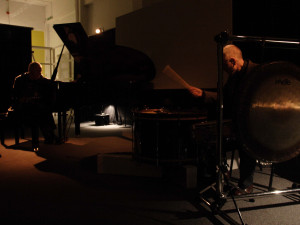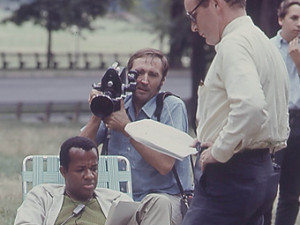Beatrice Gibson: The Tiger’s Mind
–
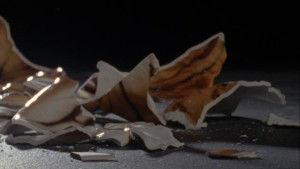
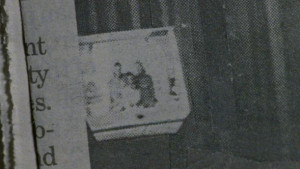

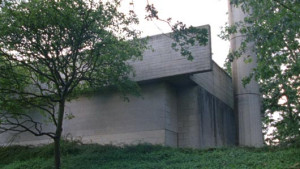
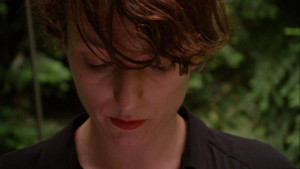
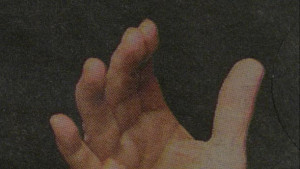
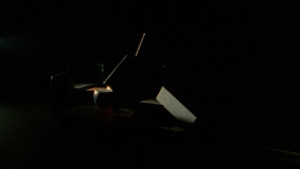
The Tiger’s Mind is an abstract crime thriller set against the backdrop of a Brutalist villa. Six characters: the tiger, the mind, the tree, the wind, the circle and a girl called Amy (the props, the music, the foley, the special effects, the author and the narrator respectively) battle one another for control of the film as it unfolds on screen. The film explores the relationships between these characters as they emerge and unfold: grappling, wrestling, and dreaming with one another.
The Tiger’s Mind is based on an experimental narrative score, penned in 1967 by the radical British composer Cornelius Cardew, whilst he was heavily involved with the free improvisation group AMM. The score features the same six characters, each of whom must interact with each other musically, according to the relationships outlined. Given that improvisation is not scored, The Tiger’s Mind can be read as a portrait of the AMM musicians as they played: a document of a set of existing social relations, as well as a music producing text.
Departing from the character-based and improvisatory nature of the score, and working with a fixed group of artists for over a year-long period (Alex Waterman as the Tree, Jesse Ash as the Wind, John Tilbury as the Mind, Celine Condorelli as the Tiger, Will Holder as Amy and Gibson as the Circle) the film deploys the score as a production structure. Participants were invited to develop its varying components: soundtrack, set, special effects, music and text. The resulting film presents a portrait of its own making in fictional form, extending narrative and character to the production process itself: tiger’s props, mind’s music, wind’s effects, tree’s foley, Amy’s narration and circle’s authorship all knock up against each other in a battle for primacy.
Gibson’s related short film Agatha (2012) is also presented at The Showroom. Conceived in the context of the exhibition, as a footnote to the larger work and serving as an insert to the publication, Agatha is a psychosexual sci-fi about a planet without speech, based on a dream that Cardew had in 1967. Both films further Gibson’s ongoing research into musical modes of production and their potential relationship to film.
The Tiger’s Mind was developed as part of a two-year publishing project initiated by Gibson and Holder in 2010, with the intention of deploying The Tiger’s Mind as a means for producing and documenting speech. A series of week-long character driven conversations were set up and hosted by Künstlerhaus Stuttgart, CAC Brétigny and Kunstverein, Amsterdam. A publication edited and produced by Holder, documenting this process has been published by Sternberg Press on the occasion of this exhibition.
The Tiger’s Mind was also presented at Index – The Swedish Contemporary Art Foundation, Stockholm in December 2012 and CAC Brétigny in April 2013. Extending the idea of the score beyond the film’s production to include its exhibition and distribution The Tiger’s Mind will be re-iterated differently at each institution, with different characters taking a more central role.
The Tiger’s Mind received its cinema premiere at the BFI as part of The London Film Festival’s Experimenta Weekend curated by Mark Webber and is also being screened at the Leeds Film Festival in conjunction with the exhibition Additionals by Céline Condorelli, commissioned by Pavilion, Leeds.
The image of the tiger in the film is inspired by the performance of Tarzan Noir, by Marcello Maloberti, held at CAC Brétigny in October 2011.
The Tiger’s Mind is co-commissioned by The Showroom and CAC Brétigny, produced in partnership with Index – The Swedish Contemporary Art Foundation, Stockholm and Somesuch & Co.
The exhibition is supported by Pavilion, Leeds, Kunstverein, Amsterdam (with support from Straat van Sculpturen) and Künstlerhaus Stuttgart.
The film is supported by Fluxus, a Franco-British Fund for Contemporary Art, Arts Council England, Outset Contemporary Art Fund as The Showroom’s Production Partner 2012, Index – The Swedish Contemporary Art Foundation, Stockholm and CAC Brétigny.
The Tiger’s Mind is realised in the framework of COHAB , a two-year project initiated by The Showroom, Casco – Office for Art, Design and Theory, Utrecht and Tensta Konsthall, Stockholm, supported by a Cooperation Measures grant from the European Commission Culture 2007–2013.
